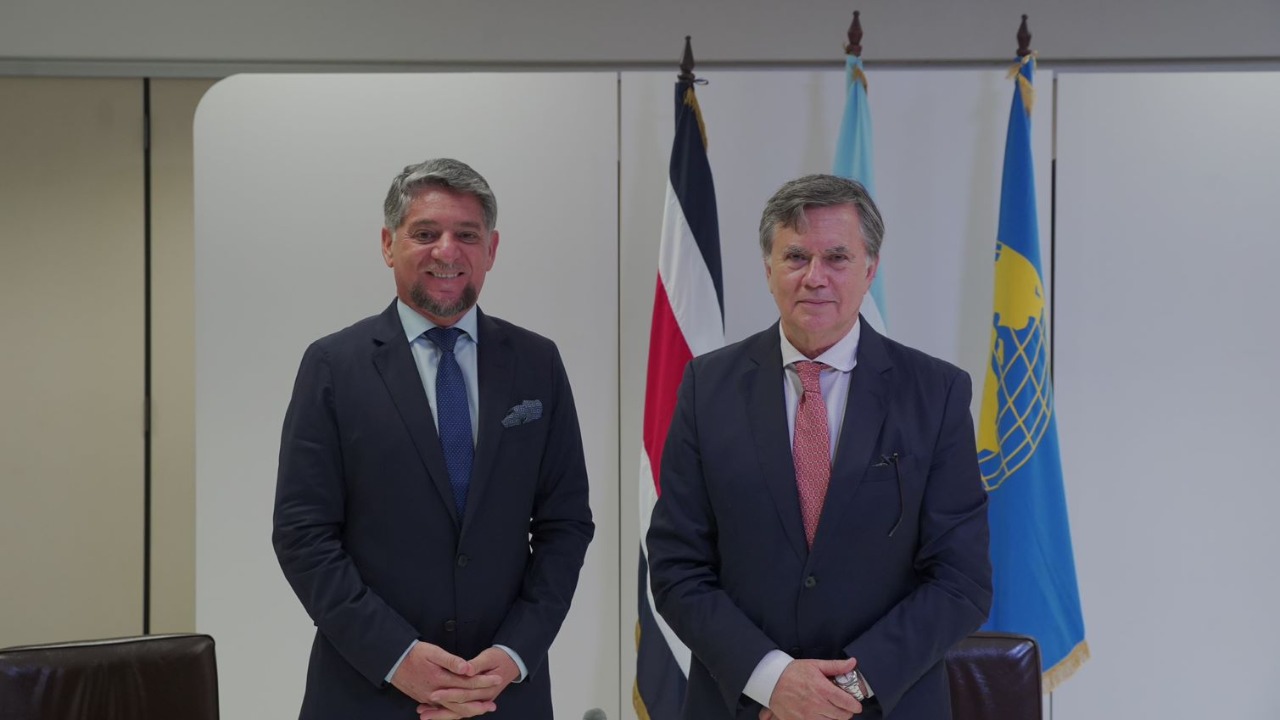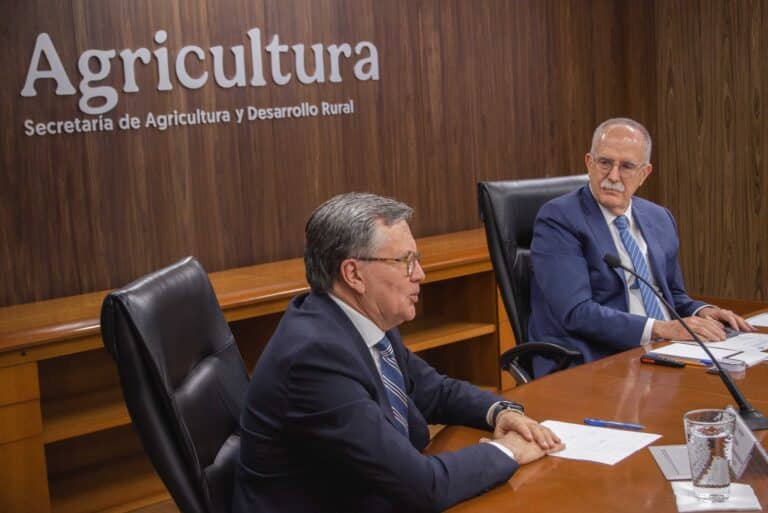These were the words of the Undersecretary for Latin American and Caribbean Affairs in Argentina’s Ministry of Foreign Affairs and National Coordinator of the Community of Latin American and Caribbean States (CELAC), during a dialogue with Manuel Otero, Director General of IICA.

San Jose, 11 May 2022 (IICA) – Technical cooperation today must include a strong social component and be closely tied to the demands and collective needs of its direct beneficiaries.
This was the view expressed by Ambassador Gustavo Martínez Pandiani, the Undersecretary for Latin American and Caribbean Affairs in Argentina’s Ministry of Foreign Affairs and National Coordinator of the Community of Latin American and Caribbean States (CELAC) during a dialogue with Manuel Otero, Director General of the organizing entity – the Inter-American Institute for Cooperation on Agriculture (IICA). IICA’s mission is to promote agricultural development and rural well-being in the Americas.
In the conversation, which was entitled “The challenges of cooperation in Latin America and the Caribbean in the new global context”, the attendees discussed the new scenarios posed by the multitude of global crises that are creating widespread uncertainty.
Martínez Pandiani and Otero expressed the commitment of Argentina and IICA to work with other governments, the private sector and civil society organizations to increase cooperation with the most vulnerable of countries. They agreed that in this new era—marked by the COVID-19 pandemic, the war in Eastern Europe that is reshaping international relations, and the threat of climate change—the region has been presented with an opportunity, given its decisive contribution to global food security and its extraordinary wealth of natural resources.
The event was part of a series of dialogues between Otero and senior officials and international specialists on agrifood-related issues promoted by IICA since the onset of the pandemic in 2020.
Ambassador Martínez Pandiani is also the National Coordinator of the Community of Latin American and Caribbean States (CELAC), for which Argentina holds the current presidency pro tempore. Moreover, he was a former ambassador to Barbados and other Caribbean nations.
Martínez Pandiani visited IICA headquarters in San Jose as part of his commitments in the Costa Rican capital, where he represented the Argentine government at the inauguration of Rodrigo Chaves, the Central American country’s new president.
“The pandemic and other current events have created a challenge across disciplines and agricultural cooperation is no exception. The world of the future is now. We still using a classic model of cooperation for a world that no longer exists, but yet persists, and the demands of a new world are forcing us to rethink our approach”, stated Martínez Pandiani.
“Cooperation was conceived as a discipline for experts, but today we know that above all it is a social issue. Projects must be designed from the bottom up and not the other way around as in the classic paradigm of cooperation. The first thing an expert in cooperation must do is ask questions and learn to listen rather than to speak”.
The diplomat summed it up by saying, “Cooperation is still an essential activity for economic development, but it is no longer acceptable for it to be seen exclusively as a technical issue unconnected to the collective life of societies. If that were the case it would be at the whim of technocrats”.
In turn, Manuel Otero underscored the importance of technical cooperation focusing on social issues, in which both the conceptualization and development of projects are as important as the final product.
“The secret to modern cooperation is asking the right questions to empower the countries that want to be the protagonists of their own development. Here at IICA we say that in these changing times, we need to have an outward perspective from our continent, we need to promote collective action and coordinate the efforts of the public and private sectors, universities and civil society organizations to ensure no one is left behind”, said IICA’s Director General.
Martínez Pandiani spotlighted the need for the countries of Latin America and the Caribbean to learn from the COVID-19 pandemic.
“We cannot allow what happened when we had a shortage of vaccines to happen with food security. I believe the region learned that we must bolster our health and food systems, because when there is a global catastrophe, we are not necessarily a priority for other parts of the world. COVID-19 revealed global inequality. It was clear that the most vulnerable sectors of our societies paid a very high price and that cannot be the case for the food sector. We mustn’t await a food crisis to realize that we must do things differently”, he said.
The diplomat also underscored the importance of IICA given its presence in each of its 34 Member States, including the islands of the Caribbean. “Very few institutions have a presence in each and every one of the countries of the Americas. The value of this isn’t simply symbolic, but rather is the Institute’s foremost geopolitical capital. In fact, when I was ambassador to Barbados and travelled around the Caribbean, it was IICA that supported me, given its close relationship with the governments, academia, civil society and farmers in each country. Food security is a challenge for everyone and IICA can contribute much to the topic”.
Along those lines, Otero explained that for IICA, it is important to generate regional public goods and to ensure that farmers are at the center of all discussions on the future of agrifood systems.
“There are 16.5 million farmers in the region that need empowering”, said Otero, who maintained that the basic premises on which the future of agriculture must be built are the centrality of science and innovation; the leading role of women and youth; the bolstering of trade; the strengthening of associate enterprises and the indestructible alliance with the environment.
Martínez Pandiani and Otero also revived the issue of the value of Triangular and South-South Cooperation and highlighted the achievements of the API-Caribe project, which aimed to strengthen the beekeeping industry and boost the productivity of hives in Barbados, Dominica, Saint Lucia and Saint Kitts and Nevis, with the support of Argentine specialists. The initiative was the result of a Memorandum of Understanding signed by Argentina and IICA in 2009.
In 2021, the parties signed a new agreement to provide joint technical assistance to the countries of Central America and the Caribbean in different areas related to developing the productive capacity of the agriculture sector and to improving rural well-being.
“Through the API-Caribe project”, concluded Otero, “we demonstrated that technical cooperation doesn’t require a million-dollar investment, but rather solidarity and a willingness to join forces. Our continent is young and green. We have natural resources and are a region of peace. We are called on to be protagonists as we face new challenges in terms of the food, nutrition, environmental and energy security of the planet”.
More information:
Institutional Communication Division.
comunicacion.institucional@iica.int











